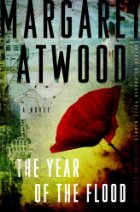On a recent road trip, I brought along Margaret Atwood's stupendous The Year of the Flood unabridged audiobook. It was good- five star, top shelf, rave to your friends until they're sick of hearing about it good.
The Year of the Flood is about the end of the world. While the book's structure is divided between the time before and the time just after a pandemic that pushes the human race to the brink of extinction (the "waterless flood" the novel's religious zealots warn about), human life was over long before the disease's outbreak.
Atwood writes about people trying to build a life in the ruins of civilization. As power and wealth concentrates to the elite few, how do the rest of us forge a life? Can you get a decent job, find a decent place to live, raise a family? Through the eyes of two survivors, Toby and Ren, Atwood shows us a world in which the corrupting power of oligarchy's decadence and self-service rips civilization apart.
Dystopic fiction is by its nature less escapist than most sci-fi and fantasy. But when it's done poorly, it drifts into sentimentality or (worse) nihilism. Atwood walks a fine line with her sinister, all-powerful CorpSeCorps. As in The Lord of the Rings, the bad guys are unstoppable, and the good guys are too fractured and divided to win without a lot of good fortune.
The God's Gardeners, the religious zealots who shelter and adopt Toby and Ren at different points in their lives, are working to build a second Eden without attracting too much attention from the CorpSeCorps' goons. The group's theology is barely coherent, featuring "saints" like Rachel Carson of Birds and Jesus of Nazereth the Fish Conservationist, and indulging in debates over what level of genetic modification and invention qualifies a creature as "real." But, the Gardeners save Toby from an abusive situation that was rapidly deteriorating.
Against the comedy of the heroes rests an avalanche of very real horrors. Both Toby and Ren are sexually abused. Both women trade sex for food, safety and survival. Both women find that their lives before the Flood are not as safe as they would have liked to believe.
At its heart, The Year of the Flood is about the human capacity to dream, the ability to imagine that this must be the worst it can get and that things will turn around soon. I think that this hopefulness is why Atwood infuses so much humor into the Gardeners- because she believes that the human ability to laugh at ourselves, to enjoy ourselves no matter what the circumstances must be as strong (if not stronger) than our tendancy towards self-destruction. As Ren observes towards the end of the novel, “The Adams and the Eves used to say, 'We are what we eat,' but I prefer to say, we are what we wish. Because if you can't wish, why bother?”



No comments:
Post a Comment